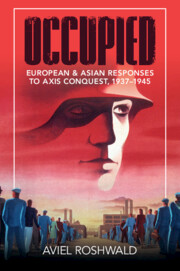Book contents
- Occupied
- Occupied
- Copyright page
- Dedication
- Contents
- Figures
- Maps
- Acknowledgments
- Introduction
- Part I Patriotisms under Occupation (the Netherlands, France, Denmark, and Thailand)
- Part II Fractured Societies and Fractal Identities: Civil Wars under Occupation (Greece, Yugoslavia, Italy, and China)
- Part III Conquest in the Guise of Liberation (the Philippines, Indonesia, and Ukraine)
- Prologue to Part III
- 7 Colonial Histories
- 8 The Ghosts of Colonialisms Past and the Weight of Occupations Present
- Conclusion to Part III
- Conclusion
- Bibliography
- Index
7 - Colonial Histories
from Part III - Conquest in the Guise of Liberation (the Philippines, Indonesia, and Ukraine)
Published online by Cambridge University Press: 20 April 2023
- Occupied
- Occupied
- Copyright page
- Dedication
- Contents
- Figures
- Maps
- Acknowledgments
- Introduction
- Part I Patriotisms under Occupation (the Netherlands, France, Denmark, and Thailand)
- Part II Fractured Societies and Fractal Identities: Civil Wars under Occupation (Greece, Yugoslavia, Italy, and China)
- Part III Conquest in the Guise of Liberation (the Philippines, Indonesia, and Ukraine)
- Prologue to Part III
- 7 Colonial Histories
- 8 The Ghosts of Colonialisms Past and the Weight of Occupations Present
- Conclusion to Part III
- Conclusion
- Bibliography
- Index
Summary
Among the countries constituting case studies in this section, the Philippines had arguably been shaped most profoundly by its colonial experience. This was in part a function of the extended duration of that experience, which had begun with Spain’s incursion into, and consolidation of power over most of, the archipelago in the course of the second half of the sixteenth century. (Most of Muslim-minority Mindanao remained beyond Spain’s effective control well into the late nineteenth century.) Unlike the Dutch East Indies, across much of which Islam had become a dominant religion by the time of European colonization, most of the islands north of Mindanao had not yet been converted to a “religion of the book” at the time of Spanish colonization. This gave Catholic missionaries an opportunity to spread their faith across the population. Successful Christianization created forms of cultural hybridity and connection that linked much of Philippine society to “the West” in ways that were no less durable for being contradiction-ridden and paradoxical. The fact that, prior to Spanish colonization, most of the island chain’s societies had been organized around relatively small, clan-based structures, rather than more demographically and territorially extensive states (with the exception of some budding Muslim sultanates), meant that there was little in the way of a “usable past” for latter-day anti-colonial activists to latch on to as a point of reference for the construction of a national identity unconnected to the legacy of Western rule. The country’s very name – chosen to honor the crown prince of the 1540s who became King Philip II of Spain in 1556 – was a relic of its conquest by Europeans. And while nineteenth- and twentieth-century nationalists promoted the adoption of a standardized form of Tagalog – one of the languages spoken on the island of Luzon – as a national language for the entire archipelago, this could and did raise hackles among speakers of some of the from-120-to-186 (depending on definition) other languages (nearly all of them also in the Malayo-Polynesian language family) used across the archipelago. First Spanish and later English were hard to displace as the Philippines’ ethnically “neutral,” culturally prestigious, lingue franche.1
- Type
- Chapter
- Information
- OccupiedEuropean and Asian Responses to Axis Conquest, 1937–1945, pp. 257 - 308Publisher: Cambridge University PressPrint publication year: 2023

